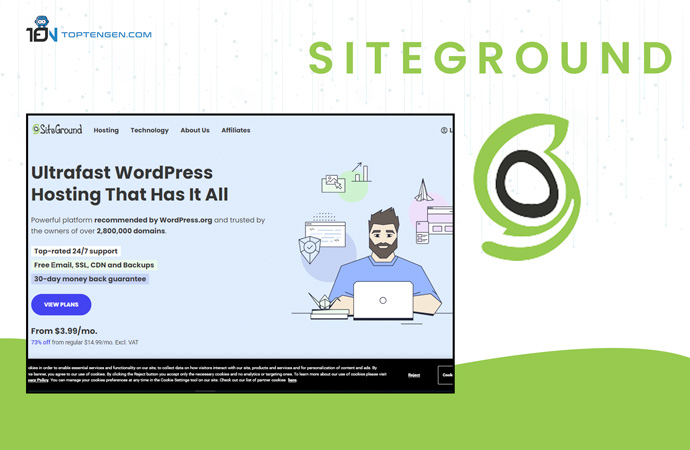Even a sloth-like visitor becomes Usain Bolt when they come across a slow website. Doesn’t matter how alluring your web design is, how bold your vision is, or how great your products are. You will always be judged on the basis of your speed. Therefore, when you are launching your website, make sure to take server speed extra seriously as every second counts.
The server speed is responsible for the speed performance of your site, which in turn is critical for search engine ranking and conversion rates. But what exactly is server speed and how do you measure it? In this article, we will provide you with an elaborate overview of server speed. So, keep on reading and keep on learning.
Server Speed: An Overview
Server speed also regarded as server response time refers to the time a web server takes to respond to a request made from a browser. Whenever a visitor types the address of your website into their browse, a request is automatically sent to your server to load the website. Now the time it takes for your website to load depends on your server speed. The faster the server speed less will be the loading time.
Influencing Factors
There are several factors that have a profound impact on server speed, such as:
Bandwidth
Bandwidth refers to the maximum amount of data that can be transferred in a given time frame from a server to a browser. Therefore, the more bandwidth you have, the more will be the server speed.
Location
Another overlooked aspect that has a great impact on server speed is the physical distance between the server and the user. The less the distance between the server and the user, the more will be the speed.
Hardware
The capabilities of the server like its processing power can have a direct impact on the speed. The better the hardware of the server the faster will be the speed.
Software
Another factor that seems to have an impact on server speed is the efficiency of software, including the OS, and other running applications.
What is the Connection Between Web Hosting and Server Speed
Web hosting is a service that stores and hosts your website, making it accessible to visitors. Web hosting plays a critical part in your website’s server speed and the type of web hosting you choose determines how fast your servers respond to the requests of users.
Shared hosting is a type of web hosting that is more on the economical side and is ideal for small websites or blogs that receive low traffic. However, as the name suggests, you share server resources with other websites. Therefore, in this shared hosting environment, your server speed can sometimes decrease.
If you are willing to spend a little money in order to salvage your server speed, then you can go for either VPS hosting, Cloud hosting, or dedicated hosting. They offer better speed and performance as compared to shared hosting. However, you should opt for them only if you have a large business with high traffic. Otherwise, spending all that money might not be worth it.
How Does Server Speed Affect Your Choice in Web Hosting?
User Experience
The speed of your website has a huge impact on user experience. As visitors have zero patience when it comes to slow-loading sites, a slow server speed can increase your bounce rates. A study shows that users typically give 3 seconds for a site to load. If it doesn’t load in that time frame, they will exit your web page faster than you can say ‘server speed’.
Search Rankings
Search engines such as Google and Bing prioritize those websites that load quickly and give them a higher rank. Therefore, a fast server speed can improve your search engine ranking, enhancing visibility, and resulting in high traffic volume and conversion rates. Therefore, for the sake of your website’s success, opt for a web hosting service that is known for fast server speeds.
Scalability
If you expect your website to grow in the future, opt for a web host that can handle the increased traffic without slowing your website down. Keep in mind that not all web hosts are equipped to handle scalability. Therefore, select a web host that harbors more server resources that will help maintain your site speed even during high-traffic periods.
Reliability
The better the speed the more reliable will be your server. If your server is constantly slowing down it means that there is a stability issue, which can lead to higher downtime. Reliable web hosting services provide consistent fast server speeds, making sure that it is easily accessible to users.
How to Select an Efficient Web Host?
It is of vital importance that you select a web host that offers optimal server speed. The success of your website greatly depends on the server. Therefore, when selecting a web host consider the following options:
Consider the Server Location
The physical location of a server can have a huge impact on its speed. Like for example if your primary audience is in the United States, it would be advantageous to go for a web host that has servers located in the States. Some top-notch web hosts like Bluehost have servers in multiple locations, which can prove quite beneficial if you have a global audience.
Determine Your Hosting Needs
As mentioned before, there are four types of web hosting:
- Shared Hosting
- VPS hosting
- Dedicate hosting
- Cloud
The type of hosting you choose can have an impact on your server speed. Therefore, before making the decision take into consideration the complexity of your website, traffic volume, and of course budget.
Search for Scalable Solutions
Your web hosting needs will change with the growth of your website. Therefore, opt for a web host that offers scalable solutions, allowing you to easily upgrade according to the needs of your website.
How to Measure Server Speed?

You cannot improve something that you can’t even measure. Therefore, it is of pivotal importance that you know how you can measure your server speed. Fortunately, you won’t have to spend countless hours searching for tools that can help you measure server speed, as we have done the hard work for you. Following are the two most popular tools that you can use to measure server speed.
GTmetrix
If you are looking for a tool that offers a comprehensive analysis of your website’s speed, then go for GTmatrix. Apart from comprehensive analysis the tool also takes into account all the factors that are influencing your website’s performance such as DNS lookup time, website design as well and media file usage.
Google PageSpeed Insights
With Google PageSpeed Insights you not only get a score for your server speed but also get suggestions on how you can improve it. The tool breaks down the results for desktop and mobile devices, giving you insight into the user experience on different platforms.
Fastest Web Hosting Providers
After spending lots and lots of money and of course, putting our eyesight on the line, we found two web hosting providers that offer a complete package when it comes to server speed and hosting.
Hostinger

Features
- Unlimited bandwidth
- LiteSpeed Web Server
Overview
Hostinger is the most affordable and fastest web hosting provider in the market right now. The platform harbors optimizations that help speed up your website. It also houses speed-boosting features LiteSpeed Web Server, Hypertext Preprocessor, and LiteSpeed Cache. All these features facilitate fast and stable speed, making sure that the website stays at the top of its game. Moreover, the web host also provides its users with Page speed, and Analytics panel integrations, which help track the site’s performance, bandwidth usage, and requests. Furthermore, the web hosting service provides 8 server locations that help battle latency and decrease loading time.
| Uptime | 100% |
| Average response time | 511ms |
| Fully built site loading time | 0.8s |
| On-site traffic | 50 VUs |
SiteGround

Features
- Native CDN
- SuperCacher
- Ultra-fast PHP
Overview
SiteGround is a groundbreaking, speedy web hosting service. It is known for its performance centric approach and top-notch speed boosting features. Among these, the Optimizer plugin is the most renowned one as it helps increase the speed of websites. After several speed tests, it was deduced that the web host provided reliable and consistent speed, even during high-traffic periods. Moreover, its ultra-fast PHP helps decrease the server’s response time, whereas SuperCacher helps boost site loading speed, all the while increasing the number of hits your site can handle. SiteGround houses seven server locations that help optimize the speed of the website.
| Uptime | 99.99% |
| Average response time | 217ms |
| Fully built site loading time | 1.8s |
| On-site traffic | 50 VUs |
